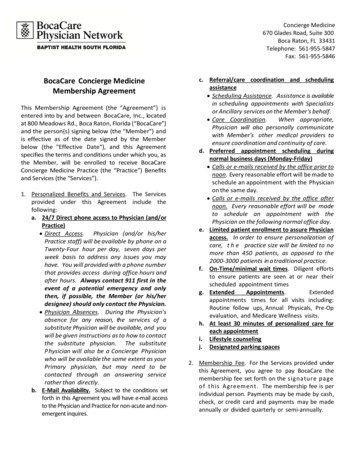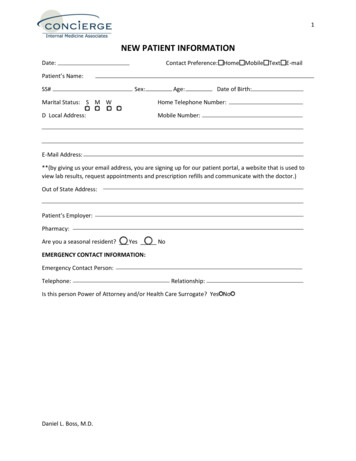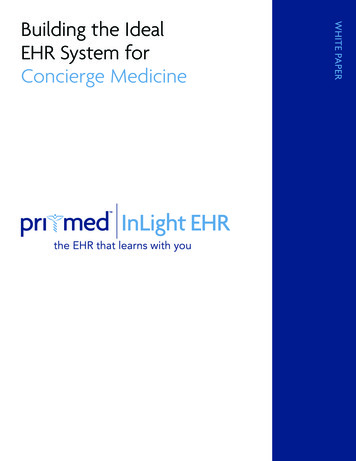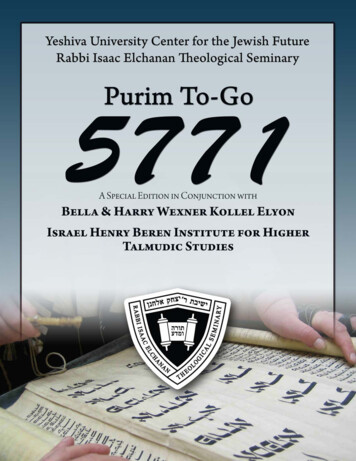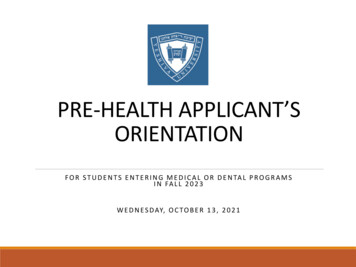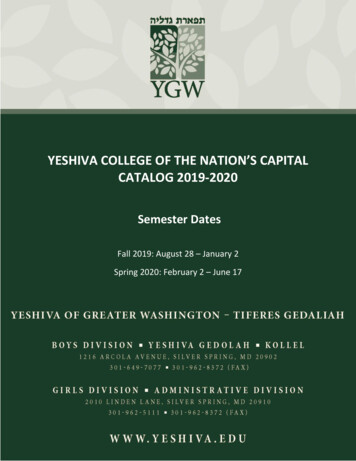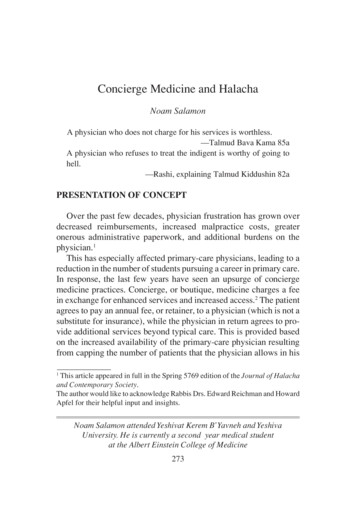
Transcription
Concierge Medicine and HalachaNoam SalamonA physician who does not charge for his services is worthless.—Talmud Bava Kama 85aA physician who refuses to treat the indigent is worthy of going tohell.—Rashi, explaining Talmud Kiddushin 82aPRESENTATION OF CONCEPTOver the past few decades, physician frustration has grown overdecreased reimbursements, increased malpractice costs, greateronerous administrative paperwork, and additional burdens on thephysician.1This has especially affected primary-care physicians, leading to areduction in the number of students pursuing a career in primary care.In response, the last few years have seen an upsurge of conciergemedicine practices. Concierge, or boutique, medicine charges a feein exchange for enhanced services and increased access.2 The patientagrees to pay an annual fee, or retainer, to a physician (which is not asubstitute for insurance), while the physician in return agrees to provide additional services beyond typical care. This is provided basedon the increased availability of the primary-care physician resultingfrom capping the number of patients that the physician allows in his1This article appeared in full in the Spring 5769 edition of the Journal of Halachaand Contemporary Society.The author would like to acknowledge Rabbis Drs. Edward Reichman and HowardApfel for their helpful input and insights.Noam Salamon attended Yeshivat Kerem B’Yavneh and YeshivaUniversity. He is currently a second year medical studentat the Albert Einstein College of Medicine273Wiesen.indb 2734/28/09 4:12:42 PM
274And You Shall Surely Healpractice (typically from 3,000–4,000 down to 100–600). Organizedand centralized concierge medicine has recently developed into afranchised market in which organizations, such as MD and MDVIP,have led to the increased prevalence of this so-called boutique medicine.2 Fees for such services range from 60 to 20,000 annually,with an average between 1,500 and 2,000 (MDVIP charges 1,800;MD charges 20,000).3 Proponents of the program argue that it improves quality care and increases the attention and time allotted to apatient’s appointment. For example, in MDVIP a patient is guaranteed a comprehensive physical examination and a follow-up wellness plan as well as medical records in CD-ROM format, personalized Web sites for each patient, same- or next-day appointments thatstart on time, as well as unhurried visits.4 Furthermore, conciergemedicine gives the physician financial security, allowing him to focus primarily on medicine, with less emphasis on financial burdens.This would diminish physician burnout from overwork.5 However,detractors worry that concierge medicine will lead to elitism, discrimination, patient abandonment, restricted access to medicine, andreduced quality care for the general population. Eighty-five percentof physicians’ current patients would be dropped from their currentphysician. If a majority of primary-care physicians become boutiquedoctors, it will exacerbate an already tiered healthcare system, leaving quality care in the hands of the wealthy, while overburdening thePortman, J Health Life Sci Law. 2008 Apr;1 (3):1, 3–4 fn. 1, 35.Government Accountability Office (GAO). “Report to Congressional Committees,Physician Services: Concierge Care Characteristics and Considerations forMedicine,” GAO-05-929 (August, 2005). Available at www.gao.gov/new.items/d05929.pdf.4Carnahan, “Law, Medicine and Wealth: Does Concierge Medicine PromoteHealth Care Choice or Is It a Barrier to Access?” Stan L & Pol Review. 121,123–129 & 155–163 (2006). Also Portman, J Health Life Sci Law. 2008 Apr 1(3): 27.5“Boutique Medicine: When Wealth Buys Health,” CNN.com, October 19, 2006,“Doctors’ New Practices Offer Deluxe Services for Deluxe Fees,” New YorkTimes. January 15, 2002, and “For a Retainer, Lavish Care by Boutique Doctors,”New York Times, October 30, 2005.23Wiesen.indb 2744/28/09 4:12:42 PM
Concierge Medicine and Halacha275remaining patient population, who will then receive sub-par care.Moreover, concierge medicine may allow a physician to selectivelychoose patients who are healthier and require less maintenance. Thiswill leave sicker patients to a more drained and less accessible healthcare system.3, 4 Furthermore, treating only those who can afford theretainer, according to the New York Attorney General’s Office,might violate non-discrimination laws.6HALACHIC ANALYSISThe goal of this paper is to explore the halachic issues that mayoccur for a physician looking to become a boutique physician. Thisarticle will analyze the power of the physician to charge for healthcare services rendered. Specifically, what is a physician allowedto charge, and is there a concept of overcharging regarding patientfees? Furthermore, is a physician allowed to deny care to a patient,especially for monetary reasons?Physician FeesThe Talmud explains that if a person takes a vow to avoid giving benefit to someone, he can still administer medical treatment tohim.7 Rishonim explain that healing a person is a positive Biblicalcommandment, something that a person cannot take a vow against.8Exactly what commandment is being fulfilled by healing a sick person? The Talmud9 and Sifre10 explain the verse vehashevota lo,11Joseph Baker, Chief of Health Care Bureau of New York Attorney General’sOffice, April 2004: “If you are treating patients differently based on ability topay, that may run afoul of New York State [non-discrimination] laws” quotedin “Patients with Perks: Advocates Say ‘Concierge Medicine Is Like Having theNeighborhood Doctor Back; Critics Call it Elitist,” Newsday, Jan 1, 2005, B06.7Nedarim 38b.8Ran and Rosh, ibid.9Sanhedrin 73a.10Deuteronomy 22:2.11Ibid.6Wiesen.indb 2754/28/09 4:12:43 PM
276And You Shall Surely Heal“you shall return it to him,” as applying not merely to inanimateobjects but also to the obligation on a person to return the health ofa person who is sick. Although a literal interpretation of the versewould seem to be focusing on returning property, the Talmud expands the scope of the verse’s application by explaining that thereis no greater act of returning than to restore someone’s health.12 It isthis verse that Maimonides13 and the Ran14 quote as the source forthe Biblical obligation to heal a sick person. Even those rishonimwho disagree with Maimonides and the Ran do so over a minutedetail, regarding exactly which verse is the source of the commandment. However, they all agree that a Biblical obligation exists.For example, Nachmanides cites the verse vichei achicha emach,15“let your brother live with you,” while others16 quote the verse lota’amod al dam re’echah,17 “you shall not stand aside while yourfellow’s blood is shed.” Assuming the commandment of healing thesick is on a Biblical level, irrespective of the exact source,18 manyrishonim wonder how it is possible that a physician can charge forhis services ,since the Talmud19 explains, based on the verse re’eylemaditi chukim u’mishpatim,20 “see I have taught you the laws,”that just as Moses was taught laws from God without payment, sotoo teachers should educate without receiving payment.21 The concept of not receiving payment is not localized to the positive commandment to teach the Torah but applies to all positive commandBava Kama 81b.Pirkei Avot 4:5.14Nedarim 41b.15Leviticus 25:36.16Tosafot HaRosh and Tosafot Rid commenting on Brachot 60a.17Leviticus 19:16.18Some practical differences do exist regarding exactly which verse to deduce theobligation from. See Bracha L’Avraham, p. 216 fn. 24.19Nedarim 37a; see also Meiri there.20Deuteronomy 4:5.21Some rishonim (Ran and Maharsha commenting on Nedarim loc. cit.) interpretthe Talmudic passage as follows: Just like Moses taught the Jewish people theTorah for free, so too you should teach it without charging.1213Wiesen.indb 2764/28/09 4:12:44 PM
Concierge Medicine and Halacha277ments.22 Thus, just as a teacher is forbidden to receive money forpracticing his profession, so too a physician cannot be allowed toreceive payment for his services.However, the Talmud takes it for granted in many places that aphysician does in fact get paid for his services. For example, theTalmud mentions: “A person with eye pain should pay the doctor[to treat him].”23 Similarly, in a different tractate, the Talmud comments on a person who is successful, “You will be considered acrafted physician and will get a large salary.”24 Interestingly, theTalmud’s example of a vocation that receives a large salary is a physician. Finally, and most strikingly, the Talmud comments on physician salaries, “A physician who practices for free is worthless.”25Many rishonim explain this passage as follows: if a physician wereto work for free, he would not be able to fully concentrate on thepatient’s care and needs.26 Having a salaried physician is importantin ensuring the proper quality of care and attention to the patient.Thus, a seeming contradiction exists as to whether physicians areallowed to receive fees for their service according to Jewish law.Although many rishonim provide answers to this question, it isimportant to first elucidate two observations as to where this question would apply. First, the contradiction may only exist where theverse vehashevota lo would apply—to a patient who has alreadybeen diagnosed and is being treated for a known ailment.27 However,well visits, checkups, physical examinations, or preventive procedures may not fall under the rubric of returning a person’s healthand would thus pose no problem in charging money according toJewish law. Only if the patient has lost his health and the physician is actively returning it to him would there be a fulfillment ofBeit Hillel commenting on Shulchan Aruch,Yoreh Deah 336:6.Ketubot 105a.24Sanhedrin 91a.25Bava Kama 85a.26Rosh commenting in Bava Kama 8:1, Shitah Mikubetzet, ibid.27For example, according to Maimonides (see n. 13).2223Wiesen.indb 2774/28/09 4:12:45 PM
278And You Shall Surely Heala positive Biblical commandment.28 It is also a possibility that preventive medicine, although not falling under the category of returning lost property, may be Biblically obligatory according to manyRishonim,29 based on a separate obligation of heshamer lechah ushhemor nafshechah,30 “protect yourself and guard your soul.” If thiswere the case, charging a fee for preventive medicine would remainproblematic. Second, it should be noted that some explain the positive commandment of healing a person as being contingent on thesuccess of the treatment.31 If a person recovers, then the physicianhas done a positive commandment, but if the treatment fails and theperson remains ill, then no commandment has been fulfilled. Thiswould seem to fit well with those who use the verse vehashevota loas the source for healing the sick. Just as a person fulfills the obligation of returning a lost article when the owner is again in possessionof his object, so too a physician should fulfill his obligation whenthe patient has reacquired his health. Thus, according to the YadAvraham, as long as the physician charges for his services ratherthan for the outcome of the treatment, there would appear to be nocontradiction as cited above.32To answer the seeming contradiction, the following question isposed by many rishonim. If the Biblical obligation to heal a sickperson is derived from the verse vehashevota lo,11 then why does theTorah have a more explicit reference for healing a person: verapoyerapey,32 “you shall surely heal him”? While this seemingly extraSee Halacha U’Refuah, vol. 2 p. 142, Responsa Maharam Shik, Yoreh Deah343, Encyclopedia Talmudit, vol. 10 p. 345.29Maimonides Yad Chazakah Rotzeach 11:4 and Shulchan Aruch, ChoshenMishpat 427:8. (The Minchat Chinuch, no.546, questions whether Chazal referredto this verse only as pertaining to avoiding forgetting God or also to protecting one’s physical body.) For further discussion, see Buchbinder, “PreventiveMedicine,” Journal of Halacha and Contemporary Society, vol. 42, pp. 70–101.30Deuteronomy 4:15.31Yad Avraham, Yoreh Deah 336:1, also see Rabbi Lamm in Journal of Halachaand Contemporary Society, vol. 8 pp. 7–10.32Exodus 21:19.28Wiesen.indb 2784/28/09 4:12:45 PM
Concierge Medicine and Halacha279neous verse has many interpretations,33 many explain that this versegives the physician legal permission to collect a fee for his work despite the general concept of abstaining from collecting money whenperforming a Biblical obligation.34 Thus, the “permission” that theTalmud explains based on the verse verapo yerapey is the permission to accept a fee for medical services. However, although thisBiblical exegesis is documented and supported by many rishonim, itdoes not appear in the codified Jewish law. What does appear in themagnum opus of Jewish law is a prohibition regarding physicians receiving payment for services rendered.35 However, a physician maybe compensated for having refrained from his other employmentthat he could have been involved in while delivering services to thepatient (s’char batalah)36 and for time and effort (s’char tirchah).Tosafot, Rashba, and Tosafot HaRosh commenting on Brachot 60a—includeshealing for diseases that are not directly caused by man; Rav Kook, Daat Cohen140—The verse gives permission to treat when it is uncertain; Shach, Yoreh Deah336:1—a warning to treat people lest a person avoid treating someone for fear ofkilling them; Torah Temimah, Exodus 15:27 and Deuteronomy 22:2—since themain source for healing is only an exegesis by the rabbis, another verse is necessary to unequivocally mention the obligation. Alternatively, verapo yerapey onlygives permission for the physician to heal, but vehashevota lo elevates healingthe sick to a Biblical obligation; Ibn Ezra, Exodus 21:19—The Torah only givesa physician the power to heal external visible injuries (Krayti U’Playti 188:5—since only in external injuries can a physician make an accurate diagnosis; however, regarding internal injuries where the physician cannot see the injury, it is thespeculation and imagination of the physician and not pure scientific knowledgethat makes the diagnosis) (author: one wonders what category modern imagingwould fall into). Author: the simple context of the verse verapo yerapey refers toan assailant’s obligation to reimburse the individual attacked for the money he hasspent for medical care. This may thus not be a compelling source for an obligation to heal a sick person, but rather a source for specific monetary obligations ina case of tort (see also Gur Aryeh, Exodus 21:19).34Rashi, Onkolus, and Targum Yonatan on verse verapo yerapey, Exodus 21:19;also Tosafot and Tosafot HaRosh on Brachot 60a.35Shulchan Aruch, Yoreh Deah 336:2.36For exactly how to pay a person for s’char batalah, see Encyclopedia Talmudit,vol. 11 p. 82–83.33Wiesen.indb 2794/28/09 4:12:46 PM
280And You Shall Surely HealThe logical explanation given as to why some payments are acceptable and not others is as follows: S’char batalah and tircha arepermitted by the Shulchan Aruch because they are not directly apart of the Biblical obligation, while payment for knowledge andteaching a patient is prohibited because they are the essence of theBiblical obligation to heal the sick.37 Based on this differentiation,Rav Gedalyah Rabinovitz points out that s’char tirchah shouldbe prohibited just like payment for knowledge because there is aBiblical obligation to invest time and effort to save a person’s life.38He thus explains that s’char tirchah is only permissible if the sickperson is not in danger, in which case there is no obligation to seekout the sick person immediately. Thus, even charging for time andeffort (tirchah) is prohibited in many cases. Furthermore, defining incontemporary times exactly what is considered time and effort andwhat is considered knowledge and teaching can at times be ambiguous. For example, some hold that writing a prescription is considered teaching a patient,39 while others understand it as a function ofthe physician’s time and effort.40 Thus, although the Shulchan Aruchdelineates what a physician can charge, it would appear to be difficult to extrapolate into a contemporary medical practice.The source of paying for s’char batalah appears in the Talmudin a discussion of a witness (who by bearing witness to an eventis avoiding a Biblical negative commandment) who may be paidfor missed employment.41 The cases in this talmudic passage appearto revolve around individuals who are partaking in a Biblical commandment but have another source of employment. Thus, it wouldappear that payment of only s’char batalah would be limited to anindividual who is not fully employed in a field that involves a Biblicalobligation. However, if such an individual is engaged full-time inHalacha U’Refuah, vol. 2 p. 141, based on Nachmanides, Torat Haadam andKiddushin 58b.38Halacha U’Refuah, vol. 2 p. 142, explaining Nachmanides.39Tzitz Eliezer 5 (Ramat Rachel) no. 24.40Aruch Hashulchan, Yoreh Deah 336:3, Aseh Lechah Rav, vol. 3 no.31.41Bechorot 29b.37Wiesen.indb 2804/28/09 4:12:47 PM
Concierge Medicine and Halacha281a Biblical obligation, such as modern-day physicians, it would beimpossible to pay them for their missed wages since they do nothave an alternative occupation.42 Using the same logic, Rav MosheFeinstein43 and Rav Shlomo Zalman Auerbach44 rhetorically askthat even if a physician was only able to charge for s’char batalah,how would it be calculated in a person who is not dually employed?Should one assume that if they were not physicians they could haveentered into a high-reimbursement profession? This is unknown,based on pure speculation, and not computable. Additionally, theTashbetz and Tosafot Yom Tov purport that the prohibition of a physician collecting for more than s’char batalah (i.e., knowledge andtime) does not apply if the two parties agreed to the fee in advance.45Thus, many modern-day halachic authorities have determined it tobe halachically permissible for a physician to collect a fee even forhis knowledge and time.46It is important to note that it is codified in Jewish law by theRamo that if a person is wealthy it is forbidden to earn money fromteaching Torah.47 If this Ramo is applied to the case of a physician,one must question how the Ramo would approach the talmudic passage mentioned above stating that any physician who works for freeis worthless.26 To help understand whether the Ramo would applythis talmudic passage to a physician, a deeper analysis is necessaryof the reasons behind the above-mentioned passage. The context ofthe passage deals with a person who injures another and is obligatedKetubot 105a according to Nishmat Avraham,Yoreh Deah 336; Rosh, Bechorot,loc. cit.; Tosafot Ketubot 105a, Tosafot Yom Tov commenting on Bechorot 4:6,Responsa of Radbaz, vol. 2, 622, Iggerot Moshe, Yoreh Deah, vol.4 no.52.43Responsa. Yoreh Deah. vol. 4 no. 52, see also Responsa of Rosh 56:5,whopoints out that s’char batalah exists only if a person has a job that he has taken abreak from.44See Nishmat Avraham, Yoreh Deah 336.45Responsa Tashbetz 1:145, Tosafot Yom Tov, ibid.; see further discussion below.46See Encyclopedia of Jewish Medical Ethics, p. 801, also see further discussion.47Shulchan Aruch, loc. cit. Also see Kesef Mishneh, Talmud Torah 3:10, TosafotKetubot 105a, gozrei gezeirot.42Wiesen.indb 2814/28/09 4:12:48 PM
282And You Shall Surely Healto pay his medical bills. The Talmud explains that the injurer maynot force the injured to get free medical care, since the attention andcare of the physician would be called into question if he was not receiving any money. Thus, the talmudic passage may be limited to acase of attempted coercion of the injured party into a free physicianover another, more expensive option. The passage might not reflecthalachic reality and may rather be only a justified claim that the injured party may use when choosing a physician. Alternatively, someinterpret this talmudic passage as reflecting the obligation of the patient and not addressing a physician’s responsibility.48 If a physicianwould like to treat pro bono, he may.It is also important to note that Maimonides, himself a physician, disparages teachers of Torah who receive any payment whatsoever from teaching.49 Many rishonim argue with Maimonidespoint by point on his numerous proofs.50 One such dissenter, theTashbetz, argues forcefully that Maimonides was a unique figurein his time—respected as a superb physician and Torah scholar.51It would be easy for him to not have to collect fees for his workdue to his stature. However, most other people, who are not of suchstature, need to actively seek a livelihood. If they did not collect apayment for their services, they would starve to death! If this position of Maimonides was applied to all Biblical obligations, as mosthalachic authorities hold,52 it would be prohibited for a physician tocharge any money, including s’char batalah. It is possible to arguethat Maimonides’ position may only apply to teaching Torah, because the many passionate reasons he gives for not taking a wageare specific to Torah learning53 and would not necessarily apply toShoshanat Ha’amakim, verapo yerapey, no. 71, see later discussion regardingrefusal to treat.49Peirush Hameshnayot, Avot 4:5, Yad Chazakah, Talmud Torah 3:10; positionelucidated by Tosafot Yom Tov commenting on Mishnah Bechorot 4:6.50Kesef Mishneh, ibid.51Responsa 147.52Beit Hillel, ibid., Nachmanides, Torat Haadam.53Talmud Torah ibid.48Wiesen.indb 2824/28/09 4:12:48 PM
Concierge Medicine and Halacha283other positive commandments.54 Just as the rabbis instituted a payment for someone who returns a lost object and fulfills a positiveBiblical commandment,55 so too the rabbis can institute the paymentof fees to physicians.56Prima facie it would appear that Nachmanides, also a physician,disagrees with almost everything that has been presented thus far,arguing that the practice of medicine is incongruent with a Godfearing existence.57 In his discussion regarding the ultimate blessings, he writes that the Jewish people will be above the rules governing nature. No disease will exist, for God is the ultimate physician. “Those who seek out the prophets cannot seek out a physician.There is no place for a physician in the house of a God-fearing person.” Nachmanides explains that the purpose of the verse verapoyerapey is to give a physician the ability to treat a person who inappropriately sought out medical help. It would seem, according toNachmanides, that there is no Biblical obligation for a physician totreat a patient and thus no legal impediment to the collection of fees.However, if this is in fact his opinion, many questions surface. First,how does Nachmanides explain the talmudic passage in Bava Kama81a which specifically states that healing the sick is a Biblical commandment. Furthermore, the Tzitz Eliezer poses another question,58based on a different talmudic passage which rejects sanctioning aprayer for a sick patient that focused on not seeking human help indisease.59 The rejection of this prayer by the Talmud is upheld afterSee also Even Haezel Gezeylah 3:12 and Encyclopedia Talmudit, vol. 11 pp.80–81.55Using the precept of hefker bayit din hefker; see Maimonides, PeirushHamishnayot, Nedarim 4:2; Tiferet Yisrael, Nedarim 4:2; Rosh, Bava Metziah2:28; and Encyclopedia Talmudit, vol .11 pp. 80–81.56See Halacha U’Refuah, vol. 2 p. 140; Machaneh Efraim 17 differentiates between returning lost objects where there is no obligation to seek out a lost objectand a seriously ill person where the Torah requires a physician to seek out sucha person.57Leviticus 26:11.58Tzitz Eliezer, vol. 5:20 (Ramat Rachel).59Brachot 60a.54Wiesen.indb 2834/28/09 4:12:49 PM
284And You Shall Surely Healciting the verse verapo yerapey. Thus, permission is also given tothe patient to seek medical attention, and he is not obligated to relysolely on a miracle. Moreover, Nachmanides himself cites the verseverapo yerapey and vechai achichah imach as a positive commandment.60 The Nishmat Avraham suggests that Nachmanides may bereferring only to a patient seeking medical attention as a preventivemeasure where there is no hint of a disease.61 However, the NishmatAvraham points out that such a stance is against the view of contemporary halachic authorities like Rav Shlomo Zalman Auerbach andRav Moshe Feinstein.62 With these points in mind, many contemporary halachic authorities explain Nachmanides’ opinion, rejectinghuman intervention in curing disease, as referring to a precise timeand specific circumstances during the rule of the prophets of earlyJewish history.63 However, he never intended to apply this to thecircumstances of the Diaspora, when prophetic times have ceased.Determination of FeeFrom the preceding discussion, halachic authorities have determined that it is legal according to Jewish law for a physician tocharge money (since a physician does not have a different full-timejob from which he receives compensation)43 for services rendered.However, it is important to understand exactly how a physiciancan determine his fees and whether he may charge a high fee. TheShulchan Aruch, in discussing the fee that witnesses to a divorcedocument receive, points out that a clause exists stipulating that ifdue to them a problem arises, they would have to pay for anotherdivorce document.64 Therefore, due to their monetarily high-risk activity, these witnesses are allowed to charge a high fee. The NishmatTorat Haadam “Inyan Hasakanah,” Leviticus 25:36.Yoreh Deah 336, p. 274.62See Nishmat Avraham, Yoreh Deah 336, p. 275.63Tzitz Eliezer, loc cit.; Yechaveh Daat 1:81.64Even Haezer 130:21.6061Wiesen.indb 2844/28/09 4:12:50 PM
Concierge Medicine and Halacha285Avraham feels that this case would apply to physicians as well.65Furthermore, the Tashbetz mentions that as long as the fee was discussed before the administration of treatment, there is no legal hindrance for the physician to charge a high fee.66Furthermore, it is essential to understand whether a physicianwho charges a high fee would be allowed to collect the fee. Wouldhe be violating a Jewish prohibition of overcharging?67 Can the physician legally collect from the patient who has not paid, and is thepatient allowed to claim a reimbursement if he does pay the highfee? The Shulchan Aruch rules in a case where someone is fleeingfrom jail and employs a sailor to assist him in crossing a river for avery large fee:68 the person is only obligated to pay what a normalfee for crossing a river would be.69 If this ruling were extrapolated toa physician, it would appear that although a physician may have theability to charge a high fee, the patient may not have an obligationto pay the full fee, and thus the physician would not have the right tocollect the full unpaid fee. Some rishonim and acharonim do applythis ruling to the case of a physician.70 However, most commentarieson the Shulchan Aruch do not apply this ruling to the case of a physician.71 They write that once the patient agrees to the physician’sYoreh Deah 336:M.Responsa 1:145.67See Bava Metseyah 49b for further details.68Choshen Mishpat 264:7.69Yam Shel Shlomo Shlomo, Bava Kama 10:38, gives two reasons: First, thereis a set fee that sailors usually get for the trip. Alternatively, he already has aBiblical obligation to save this person; see also Shitah Mekubetzet in the name ofRamo—the employer can claim that he was joking with the employee in regardto the extra amount.70Mordechai, Bava Kama 172; Responsa of Radvaz 3:556; Ritva, Yevomot106a—since he only agreed to the payment due to the stress of his sickness. Seealso Rashi and Tosafot, Bava Kama 116b.Author: It would appear that according to the second explanation of the Yam ShelShlomo (n. 70), a physician who makes a high fee would not be able to collect theentire fee since he too is involved in a Biblical obligation.71Ramo, Taz, and Shach, Yoreh Deah 336; also Yam Shel Shlomo, Bava Kama 10:38,and Mordechai 174; see also Nachmanides, Torat Haadam, Shaar Hasakanah.6566Wiesen.indb 2854/28/09 4:12:50 PM
286And You Shall Surely Healterms, it is incumbent on the patient to pay the agreed-upon amount.Furthermore, even according to the opinion that a physician mayonly charge for s’char batalah, if they agreed upon a payment forthe physician’s knowledge and expertise, the patient is still obligated to pay in full, irrespective of how large.72 Moreover, if thepatient has already paid the fee, he has no legal standing to requestthat it be returned in part or in full. The above case of the runaway,according to these halachic authorities, is unique in that the employment of the sailor is temporary and fixed, unlike a physician’s job,which is not bound by time. It is thus the normative halachic opinionthat a patient must pay the physician the entire agreed-upon fee, nomatter how large.73 A psychological explanation is given by someacharonim as to why this is the case:74 It will prevent people fromavoiding choosing a career as a physician, and it will prevent physicians from refusing treatment unless they are paid in full from thebeginning.75An argument does exist among halachic sources as to whetherthis rule applies if there is only one physician in a city. Many feelthat if only one physician is located in the city, then there is no obligation for the patient to pay the entire high fee.76 Others,77 includingRamo, Choshen Mishpat 264:7—since it is a normative practice to pay physicians a high fee. See also Rosh, Bava Metziah 2:28 and Lechem Mishneh Gezeylah12:7 (explaining the opinion of Maimonides), who understands that the personmust pay whatever the agreed-upon amount was, without any limits. See alsoKetzot Hachoshen 264:2. Chidushei R. Shimon Shkup, Bava Kama 19, who arguesthat even though the Rosh permitted large fees, he did have a maximum amountbased on the maximum salary that the person could have made in his other profession. How the R
In response, the last few years have seen an upsurge of concierge medicine practices. Concierge, or boutique, medicine charges a fee in exchange for enhanced services and increased access.2 The patient agrees to pay an annual fee, or retainer, to a physician (which is not a substitute for insurance), while the physician in return agrees to pro-
